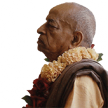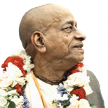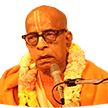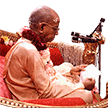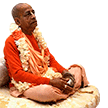Ekadasi - an essential subject: Difference between revisions
(Created page with "Category:Essential Subjects <!----------------------- edit below this line -----------------------> <!------------------------ begin introduction text --------------------...") |
(Vanibot #0041: Moves Choose Another box to the end) |
||
| Line 2: | Line 2: | ||
<!----------------------- edit below this line -----------------------> | <!----------------------- edit below this line -----------------------> | ||
<!------------------------ begin introduction text ------------------------> | <!------------------------ begin introduction text ------------------------> | ||
Ekadasi occurs on the eleventh day after the full moon and the eleventh day after the new moon. On such days no grains, cereals or beans are eaten; simply vegetables and milk are moderately taken, and chanting and reading scriptures are increased. On the day of Ekadasi, one has to reduce sleeping and utilize all his/her time in activities that are pleasing to the Lord. | |||
Srila Prabhupada's books, lectures, conversations and letters offer a comprehensive presentation of this essential subject as seen in the Vaniquotes '''[[Vaniquotes:Category: | Srila Prabhupada's books, lectures, conversations and letters offer a comprehensive presentation of this essential subject as seen in the Vaniquotes '''[[Vaniquotes:Category:Ekadasi|Ekadasi]]''' category. An introduction from his books is given below in the following 8 quotes. | ||
<!-------- end introduction text and don't touch next three lines ---------> | <!-------- end introduction text and don't touch next three lines ---------> | ||
---- | ---- | ||
== Quotes from Srila Prabhupada's books == | == Quotes from Srila Prabhupada's books == | ||
<!----------------- edit quote boxes below this line -----------------> | <!----------------- edit quote boxes below this line -----------------> | ||
{{VaniQuotebox| | {{VaniQuotebox|As we generally perform devotional service on Ekadasi by not eating grains, it is generally recommended that on Dvadasi one not consume anything but milk| One should also offer a flame, incense and so on, while ringing a bell, as prescribed. This is called worship of the Lord. Here it is recommended that one observe the vow of subsisting only by drinking milk. This is called payo-vrata. As we generally perform devotional service on Ekādaśī by not eating grains, it is generally recommended that on Dvādaśī one not consume anything but milk. '''(Śrīmad-Bhāgavatam 8.16.25)'''}} | ||
{{VaniQuotebox| | {{VaniQuotebox|General practice (positive functions): He must observe the fasting dates, such as the eleventh day of the growing and waning moon| When one practices devotional service, one cultivates a desire for the kingdom of God. The following details outline a general practice by which one can prepare himself for an easy journey to the Vaikuṇṭha (anti-material) planets, where life is free from birth, old age, disease and death. - Observing the fasting dates, such as the eleventh day of the growing and waning moon. '''(Easy Journey to Other Planets, Chapter 1)'''}} | ||
{{VaniQuotebox| | {{VaniQuotebox|If one does not observe the breaking of the fast (of Ekadasi) within the time of Dvadasi, there is a flaw in one's observance of the vow|If one does not observe the breaking of the fast within the time of Dvādaśī, there is a flaw in one's observance of the vow. Therefore, O brāhmaṇas, if you think that it will be auspicious and not irreligious, I shall break the fast by drinking water." In this way, after consulting with the brāhmaṇas, the King reached this decision, for according to brahminical opinion, drinking water may be accepted as eating and also as not eating. '''(Śrīmad-Bhāgavatam 9.4.39-40)'''}} | ||
{{VaniQuotebox| | {{VaniQuotebox|One occasion for remembrance is Ekadasi, which comes twice a month on the eleventh day of the moon, both waning and waxing. On that day all the devotees remain fasting throughout the night and continuously chant the glories of the Lord|Some things which give impetus or stimulation to ecstatic love of Kṛṣṇa are His transcendental qualities, His uncommon activities, His smiling features, His devotee and the periodical occasions for remembering Him. One such occasion for remembrance is Ekādaśī, which comes twice a month on the eleventh day of the moon, both waning and waxing. On that day all the devotees remain fasting throughout the night and continuously chant the glories of the Lord. '''(Nectar of Devotion, Chapter 26)'''}} | ||
{{VaniQuotebox| | {{VaniQuotebox|One should fast on the two Ekadasi days, which fall on the eleventh day of the waxing and waning moon, and on the birthdays of Lord Krsna, Lord Rama and Caitanya Mahaprabhu|It is said that development of Kṛṣṇa consciousness is exhibited by proportionate material detachment, or vairāgya. If one does not separate himself from material enjoyment, it is to be understood that he is not advancing in Kṛṣṇa consciousness. Renunciation in Kṛṣṇa consciousness is so strong that it cannot be deviated by any attractive illusion. One has to perform devotional service in full tapasya, austerity. One should fast on the two Ekādaśī days, which fall on the eleventh day of the waxing and waning moon, and on the birthdays of Lord Kṛṣṇa, Lord Rāma and Caitanya Mahāprabhu. '''(Śrīmad-Bhāgavatam 3.27.22)'''}} | ||
{{VaniQuotebox| | {{VaniQuotebox|Specifically, recitation is recommended on the full moon or dark moon day, on the day after Ekadasi, on the appearance of the Sravana star, at the end of a particular tithi|Persons who have completely taken shelter of the lotus feet of the Lord should recite this narration of Dhruva Mahārāja without taking remuneration. Specifically, recitation is recommended on the full moon or dark moon day, on the day after Ekādaśī, on the appearance of the Śravaṇa star, at the end of a particular tithi, or the occasion of Vyatīpāta, at the end of the month, or on Sunday. Such recitation should of course be performed before a favorable audience. When recitation is performed this way, without professional motive, the reciter and audience become perfect. '''(Śrīmad-Bhāgavatam 4.12.49-50)'''}} | ||
{{VaniQuotebox| | {{VaniQuotebox|There are many fasts, such as Ekadasi and the appearance and disappearance days of God and His devotees. All of these are meant to decrease the fat within the body so that one will not sleep more than desired and will not become inactive and lazy|According to the Vaiṣṇava calendar, there are many fasts, such as Ekādaśī and the appearance and disappearance days of God and His devotees. All of these are meant to decrease the fat within the body so that one will not sleep more than desired and will not become inactive and lazy. Overindulgence in food will cause a man to sleep more than required. This human form of life is meant for austerity, and austerity means controlling sex, food intake, etc. '''(Śrīmad-Bhāgavatam 4.28.35-36)'''}} | ||
{{VaniQuotebox| | {{VaniQuotebox|To observe Ekadasi-vrata and Dvadasi-vrata means to please the Supreme Personality of Godhead. Those interested in advancing in Krsna consciousness must observe Ekadasi-vrata regularly|To worship Lord Kṛṣṇa, Mahārāja Ambarīṣa, along with his queen, who was equally qualified, observed the vow of Ekādaśī and Dvādaśī for one year. To observe Ekādaśī-vrata and Dvādaśī-vrata means to please the Supreme Personality of Godhead. Those interested in advancing in Kṛṣṇa consciousness must observe Ekādaśī-vrata regularly. '''(Śrīmad-Bhāgavatam 9.4.29)'''}} | ||
<!----------------- edit quote boxes above this line -----------------> | <!----------------- edit quote boxes above this line -----------------> | ||
''' | '''Ekadasi - [[Vaniquotes:Category:Ekadasi|explore more within this category]]'''. | ||
{{EsentialSubjectTotal}} | {{EsentialSubjectTotal}} | ||
<div style="float:left;"> | |||
{{EssentialSubjectnav}} | |||
</div> | |||
__NOTOC__ | __NOTOC__ | ||
__NOEDITSECTION__ | __NOEDITSECTION__ | ||
Latest revision as of 16:16, 22 November 2020
Ekadasi occurs on the eleventh day after the full moon and the eleventh day after the new moon. On such days no grains, cereals or beans are eaten; simply vegetables and milk are moderately taken, and chanting and reading scriptures are increased. On the day of Ekadasi, one has to reduce sleeping and utilize all his/her time in activities that are pleasing to the Lord.
Srila Prabhupada's books, lectures, conversations and letters offer a comprehensive presentation of this essential subject as seen in the Vaniquotes Ekadasi category. An introduction from his books is given below in the following 8 quotes.
Quotes from Srila Prabhupada's books
Ekadasi - explore more within this category.
Vanipedia has now over 903 introductory articles compiled from Srila Prabhupada's books under the series titled Essential Subjects. All these articles can be seen in the Table of Content on the right side of this article and also here in this Umbrella Category. Browse through them to relish the breadth and depth of Srila Prabhupada's teachings - There is a subject for everyone.

